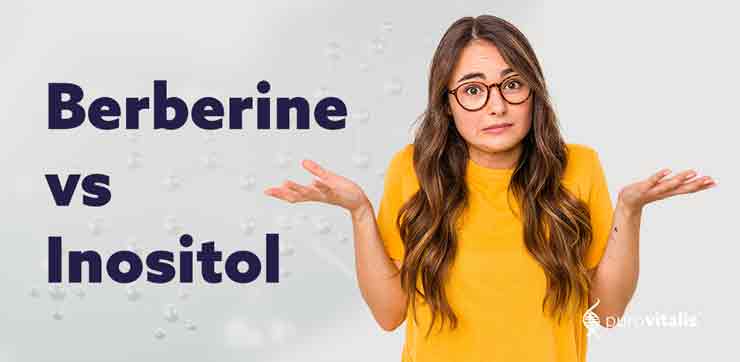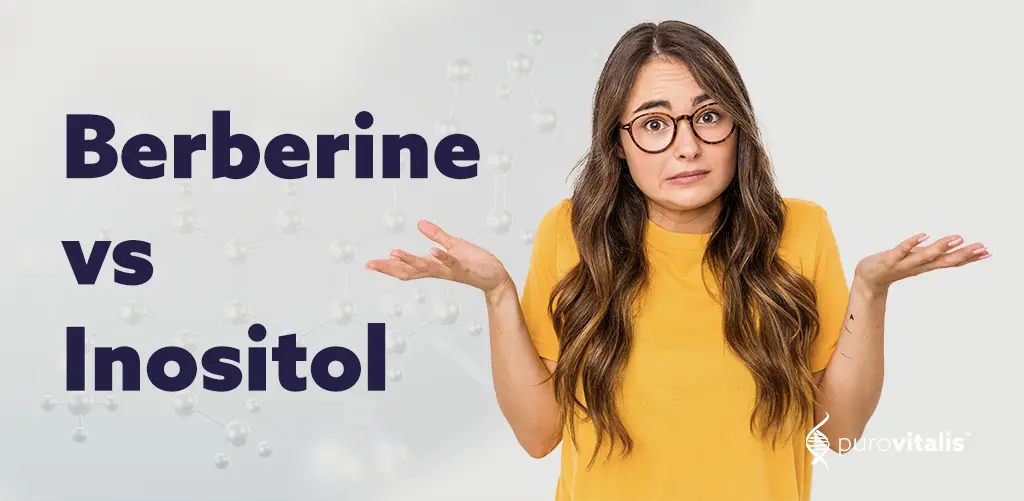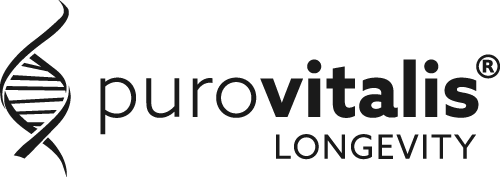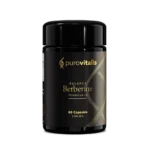
Indholdsfortegnelse
I løbet af de sidste 30 år er kosttilskudsindustrien eksploderet. Selv om der ikke findes en universalløsning, når det gælder de kosttilskud, vores kroppe har brug for, er det klart, at de giver et ekstra løft, så vores helbred bliver optimalt. Men for at vide, hvilke vitaminer og mineraler der er bedst, skal du først forstå, hvordan de virker. Hvis du ikke kender til inositol og berberin, er det på tide at ændre det! Selvom de er lidt forskellige, giver begge disse kosttilskud flere imponerende sundhedsmæssige fordele. I artiklen nedenfor forklarer vi alt, hvad du har brug for at vide om inositol og berberin.
Hvad er inositol?
Kort sagt er inositol et kulhydrat, som findes i fødevarer, og som også findes naturligt i menneskekroppen. Det interessante er, at inositols molekyler har en kemisk struktur, der ligner glukose. Derfor er det blevet mere og mere populært i de senere år og har været genstand for mange undersøgelser.
Da inositol har forskellige former (ni, for at være præcis), spiller det en afgørende rolle i forskellige kropsfunktioner. De fleste kosttilskud indeholder myo-inositol og D-chiro-inositol, som er nyttige ved en række symptomer og helbredstilstande.
Hvad gør inositol?
Det kan være en fordel at tage inositoltilskud af flere grunde. Ifølge forskning kan kulhydratet være gavnligt for mentale sundhedstilstande (herunder angst, bipolar lidelse, depression, spiseforstyrrelser og andre). Det skyldes, at myo-inositol, en form for inositol, påvirker stemningsniveauet i den menneskelige hjerne. Desuden er det forbundet med færre bivirkninger end andre lægemidler, der bruges til lignende tilstande.
Derudover er inositol også kendt for at reducere symptomer på PCOS, hjælpe med infertilitet og forbedre glukoseniveauet hos personer med type 2-diabetes.
Inositol til vægttab? En naturlig tilgang
Inositol til vægttab er ved at få opmærksomhed på grund af dets potentiale til at understøtte metabolisk sundhed. Som en naturligt forekommende forbindelse forbedrer inositol, især myo-inositol, insulinfølsomheden, hvilket kan hjælpe med at regulere blodsukkeret og reducere fedtlagring.
Undersøgelser tyder på, at inositol til vægttab kan hjælpe med at håndtere PCOS-relateret vægtøgning ved at forbedre hormonbalancen.
I modsætning til berberin, som direkte påvirker glukosemetabolismen, virker inositol til vægttab ved at understøtte cellulær signalering og lipidmetabolisme. Resultaterne er lovende, men de varierer, og det er vigtigt at kombinere inositol med en afbalanceret kost og motion.
Hvad er berberin?
Selv om berberin og inositol har ligheder, er de forskellige i deres struktur. Berberin er et alkaloid, som findes i en række planter, bl.a. rhizom, europæisk berberis og oregon drue. Takket være sine gavnlige virkninger har plantealkaloidet længe været brugt i TCM, Ayurveda og andre medicinske traditioner, primært til behandling af fordøjelsesproblemer og infektioner.
Faktisk går de tidligste optegnelser om brug af berberin mere end 3.000 år tilbage, hvor folk primært udnyttede berberins blade og bark.
Hvad bruges berberin til?
I dag ved folk, at den bittert smagende kemiske forbindelse er gavnlig for mere end blot behandling af fordøjelsesproblemer eller infektioner. Faktisk ser berberintilskud ud til at være mest effektive til behandling af PCOS, diabetes (især i kombination med traditionelle behandlingsformer), højt kolesteroltal og kræftsår.
Derudover er berberin forbundet med små forbedringer af kropsvægten, bedre kognitiv sundhed(forskning tyder på, at tilskuddet kan forebygge demens) og endda forbedret effektivitet af kemoterapi og strålebehandling. Der er dog behov for mere forskning for fuldt ud at forstå de positive virkninger af berberin.
Kan man tage berberin og inositol sammen?
Hvis du spekulerer på, om berberin og inositol kan tages sammen for at maksimere deres positive virkninger, er der ikke noget klart svar. Baseret på de nuværende undersøgelser er der ingen beviser for, at det er gavnligt eller skadeligt at kombinere begge disse kosttilskud. Faktisk er berberin og inositol blevet undersøgt sammen med andre stoffer, men ikke i samspil med hinanden.
Interessant nok viser forskning, at berberin virker mere effektivt, når det kombineres med resveratrol. Inositol ser på den anden side ud til at give flere fordele i kombination med alfa-liponsyre. Så hvis du gerne vil forbedre virkningen af enten berberin eller inositol, kan du tage dem sammen med et af disse kosttilskud i stedet.
Inositol og berberin sammen til vægttab
Vægttab kan være en udfordrende rejse. For at hjælpe processen på vej bruger mange mennesker kosttilskud som inositol og berberin, som er kendt for at have mange sundhedsmæssige fordele. Berberin hjælper f.eks. med at forbedre insulinfølsomheden og reducere inflammation, hvilket er kritiske aspekter af vægtkontrol. Inositol er imidlertid nyttigt for hormonregulering og sund hjernefunktion - to faktorer, der også spiller en vigtig rolle for vores velbefindende.
Selvom der ikke er tegn på bivirkninger ved at tage berberin og inositol sammen, bør du først rådføre dig med en sundhedsperson. Din læge vil også hjælpe dig med at finde det bedste produkt til dine specifikke vægttabsbehov.
Hvis du vil vide mere om, hvordan berberin kan støtte dit vægttab, kan du besøge vores blog, hvor vi gennemgår, om berberin rent faktisk hjælper med vægttab.
Berberin og inositol mod insulinresistens
Hvis dine celler bliver for resistente over for insulin, kan det føre til en række forskellige sundhedsproblemer, herunder diabetes og PCOS. Heldigvis kan nogle kostvaner, som f.eks. at tage de rigtige kosttilskud, hjælpe med at forebygge problemerne.
Især inositol er blevet udforsket for sit potentiale til at forbedre kroppens følsomhed over for insulin (og dermed reducere insulinresistens). Ifølge forskningen producerer kosttilskuddet molekyler, som spiller en vigtig rolle for insulins virkning i dine celler.
Berberin hjælper derimod med at kontrollere blodsukkeret ved at regulere, hvordan din krop behandler glukose. Desuden øger det insulinproduktionen og gør dine celler mere følsomme over for det.
Relateret: Glucose Goddess hacks: Få styr på blodsukkeret for sundhed og longevity
Berberin vs. inositol til PCOS
Vidste du, at polycystisk ovariesyndrom rammer 7-10% af alle kvinder i den fødedygtige alder? Desuden er det den mest almindelige årsag til infertilitet. Da PCOS er forbundet med insulinresistens (det anslås, at op til 75 % af personer med PCOS er insulinresistente), kan det være en fordel at se nærmere på kosttilskud, der kan afhjælpe dette problem, f.eks. berberin og inositol.
Inositol til PCOS
Inositol er et af de mest undersøgte naturlige kosttilskud til håndtering af insulinresistens. Ifølge forskningen hjælper inositol med at gøre dine celler mere følsomme over for insulin, så mere glukose kan komme ind i cellerne og blive brugt til energi. Det sænker insulin- og glukoseniveauet i blodet, hvilket kan forbedre ægløsningens hyppighed og funktion.
Som tidligere nævnt findes der ni former for inositol, men Myo-inositol (MI) og D-chiro-inositol (DCI) er de to former, der har størst indflydelse på tilstanden.
Berberin til PCOS
Ligesom inositol menes berberin også at være en god insulinsensitivisator. En undersøgelse i European Journal of Endocrinology viste lovende resultater - kvinder med PCOS, som indtog 500 mg berberin tre gange om dagen, oplevede en forbedring af HOMA-IR, som er en markør for insulinresistens.
Der er stadig brug for mere forskning for at forstå berberin vs. inositol til PCOS, og om det er effektivt at kombinere begge kosttilskud.
Konklusion
Med flere kosttilskud hver dag er det let at blive overvældet. Berberin og inositol har begge imponerende fordele, men husk, at det, der virker for én person, ikke nødvendigvis virker for en anden. For at opnå de bedste resultater skal du sørge for at tale med din sundhedsrådgiver og diskutere, hvilket af produkterne der passer bedst til dine specifikke behov.
Vigtigst af alt skal du huske, at kosttilskud er beregnet til at supplere. Berberin og inositol bør ikke bruges til at kompensere for usunde vaner!
Referencer
- Concerto C, Chiarenza C, Di Francesco A, Natale A, Privitera I, Rodolico A, et al. Neurobiologi og anvendelser af inositol i psykiatrien: en narrativ gennemgang. Curr Issues Mol Biol. 2023 Feb 20;45(2):1762-78. doi:10.3390/cimb45020113. PMID: 36826058; PMCID: PMC9955821.
- Okui T. Socioøkonomiske prædiktorer for tendenser i kræftdødelighed blandt kommuner i Japan, 2010-2019. Asian Pac J Cancer Prev. 2021 Feb;22(2):499-508. doi:10.31557/APJCP.2021.22.2.499. PMID: 33639666; PMCID: PMC8190362.
- Ye Y, Liu X, Wu N, Han Y, Wang J, Yu Y, et al. Effektivitet og sikkerhed af berberin alene for flere metaboliske lidelser: en systematisk gennemgang og metaanalyse af randomiserede kliniske forsøg. Front Pharmacol. 2021 Apr 26;12:653887. doi:10.3389/fphar.2021.653887. PMID: 33935664; PMCID: PMC8099004.
- Shinjyo N, Parkinson J, Bell J, Katsuno T, Bligh A. Berberine for prevention of dementia associated with diabetes and its comorbidities: a systematic review. J Integr Med. 2020 Mar;18(2):125-51. doi:10.1016/j.joim.2020.01.004. Epub 2020 Jan 16. PMID: 32005442.
- Zhu X, Yang J, Zhu W, Yin X, Yang B, Wei Y, et al. Kombination af berberin med resveratrol forbedrer den lipidsænkende effekt. Int J Mol Sci. 2018 Dec 6;19(12):3903. doi:10.3390/ijms19123903. PMID: 30563192; PMCID: PMC6321535.
- Capasso I, Esposito E, Maurea N, Montella M, Crispo A, De Laurentiis M, et al. Kombination af inositol og alfa-liponsyre hos kvinder med metabolisk syndrom: et randomiseret placebokontrolleret forsøg. Forsøg. 2013 Aug 28;14:273. doi:10.1186/1745-6215-14-273. PMID: 23981814; PMCID: PMC3765513.
- Saltiel AR. Sekundære budbringere af insulinvirkning. Diabetes Care. 1990 Mar;13(3):244-56. doi:10.2337/diacare.13.3.244. PMID: 2137771.
- Tabassum R, Imtiaz F, Sharafat S, Shukar-Ud-Din S, Nusrat U. Prævalens og klinisk profil af insulinresistens hos unge kvinder med polycystisk ovariesyndrom: en undersøgelse fra Pakistan. Pak J Med Sci. 2013 Apr;29(2):593-6. doi:10.12669/pjms.292.3180. PMID: 24353584; PMCID: PMC3809275.
- Baillargeon JP, Diamanti-Kandarakis E, Ostlund RE Jr, Apridonidze T, Iuorno MJ, Nestler JE. Ændret urinclearance af D-chiro-inositol hos kvinder med polycystisk ovariesyndrom. Diabetes Care. 2006 Feb;29(2):300-5. doi:10.2337/diacare.29.02.06.dc05-1070. PMID: 16443877.
- Fazelian S, Rouhani MH, Saraf-Bank S, Amani R. Kromtilskud og polycystisk ovariesyndrom: en systematisk gennemgang og metaanalyse. J Trace Elem Med Biol. 2017 Jul;42:92-6. doi:10.1016/j.jtemb.2017.04.008. PMID: 28460808.

Berberin-balance beskytter hjertet optimerer stofskiftet Kontrol af blodsukkeret
Almindelig berberin gør arbejdet, men dihydroberin gør det bedre, hurtigere og længere. Prøv det nu!



 Spring til indhold
Spring til indhold










